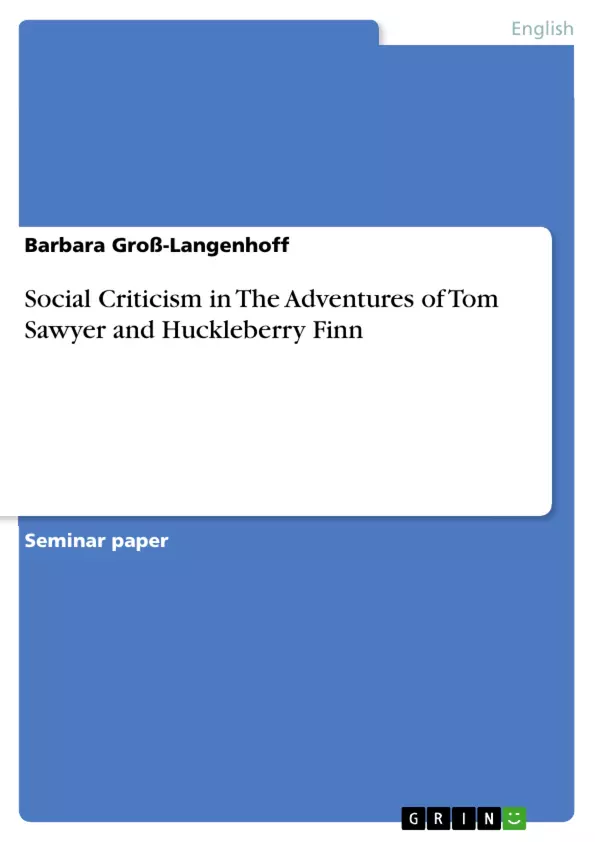Mark Twain’s novelThe Adventures of Tom Sawyer,first published in 1876, and its sequelThe Adventures of Huckleberry Finnof 1885 are widely known and praised as boyhood adventure stories. Both young and old are fascinated by the nostalgic portraits of American childhood, which are also blended with a good portion of social criticism. This essay will concentrate on the novels’ depiction of South American society and on critical observations and comments made by the author. His attitude towards societal concepts of education, religion and slavery will be examined, as will the conflict between individual and social morality, which is highlighted in the two novels. The subsequent evaluation will consider the question whether Twain’s criticism of his generation continues to be relevant today. Before I can embark, though, on the study of social criticism inThe Adventures of Tom SawyerandHuckleberry Finn,it is useful to have some background information about the period of writing and the author’s notion of childhood, which will make it easier to analyse the novels in the context of 19thcentury American children’s literature. Therefore, I am going to begin with a brief outline of the entirely opposing trends in juvenile fiction in the first and the second half of the 19thcentury.
Table of Contents
- I. Introduction
- I.1. From didacticism to romanticism in 19th century American children's literature
- I.2. Rewarded misconduct in Mark Twain's two children's classics
- II. Social criticism in The Adventures of Tom Sawyer and Huckleberry Finn
- II.1. The country school and the quality of former popular literature
- II.2. The institution of church and Presbyterian double standards
- II.3. The controversial depiction of racism
- II.3.1. Huck Finn's “sound heart” set against white brutality
- II.3.2. Maltreatment of slaves and Injun Joe in Tom Sawyer
- II.4. The “fickle unreasoning world”
- II.4.1. The mob
- II.4.2. The individual versus society
- III. Evaluation
- III.1. Twain's criticism of the Old South and post-Civil War society
- III.2. Twain's social criticism - still relevant today?
Objectives and Key Themes
This essay aims to analyze the social criticism present in Mark Twain's novels The Adventures of Tom Sawyer and The Adventures of Huckleberry Finn. It will explore Twain's critical observations and comments on Southern American society, examining his views on education, religion, and slavery. Additionally, the essay will delve into the conflict between individual and social morality as highlighted in the novels. Finally, it will evaluate whether Twain's social criticism remains relevant today.
- The contrast between the didacticism of earlier children's literature and the romanticism emerging in the 19th century.
- The portrayal of mischievous children and the acceptance of their “anti-social” behaviour by Twain.
- Twain's critical commentary on societal institutions like education, religion, and the morality of the South.
- The conflict between individual conscience and societal norms, particularly regarding race relations.
- The enduring relevance of Twain's social criticism in the context of contemporary issues.
Chapter Summaries
The introduction provides a historical context for Twain's works, comparing the didacticism of earlier American children's literature to the evolving romanticism of the latter half of the 19th century. It emphasizes how Twain challenged the prevailing notion of children's literature by celebrating the mischievous and rebellious nature of his protagonists.
The second chapter delves into Twain's social criticism, focusing on his portrayal of societal institutions and their shortcomings. It explores Twain's views on education, religion, and the hypocrisy of the church, as well as the deeply ingrained racism of Southern society.
The chapter also investigates the conflict between individual and social morality, particularly through Huck Finn's struggle with his conscience and the societal pressures he faces. It further examines the portrayal of mob mentality and the consequences of unchecked societal prejudice.
Keywords
Key concepts explored in this essay include 19th century American children's literature, social criticism, didacticism, romanticism, education, religion, slavery, racism, individual morality, societal norms, mob mentality, and the enduring relevance of Twain's critique.
- Citation du texte
- Barbara Groß-Langenhoff (Auteur), 2003, Social Criticism in The Adventures of Tom Sawyer and Huckleberry Finn, Munich, GRIN Verlag, https://www.grin.com/document/49160



